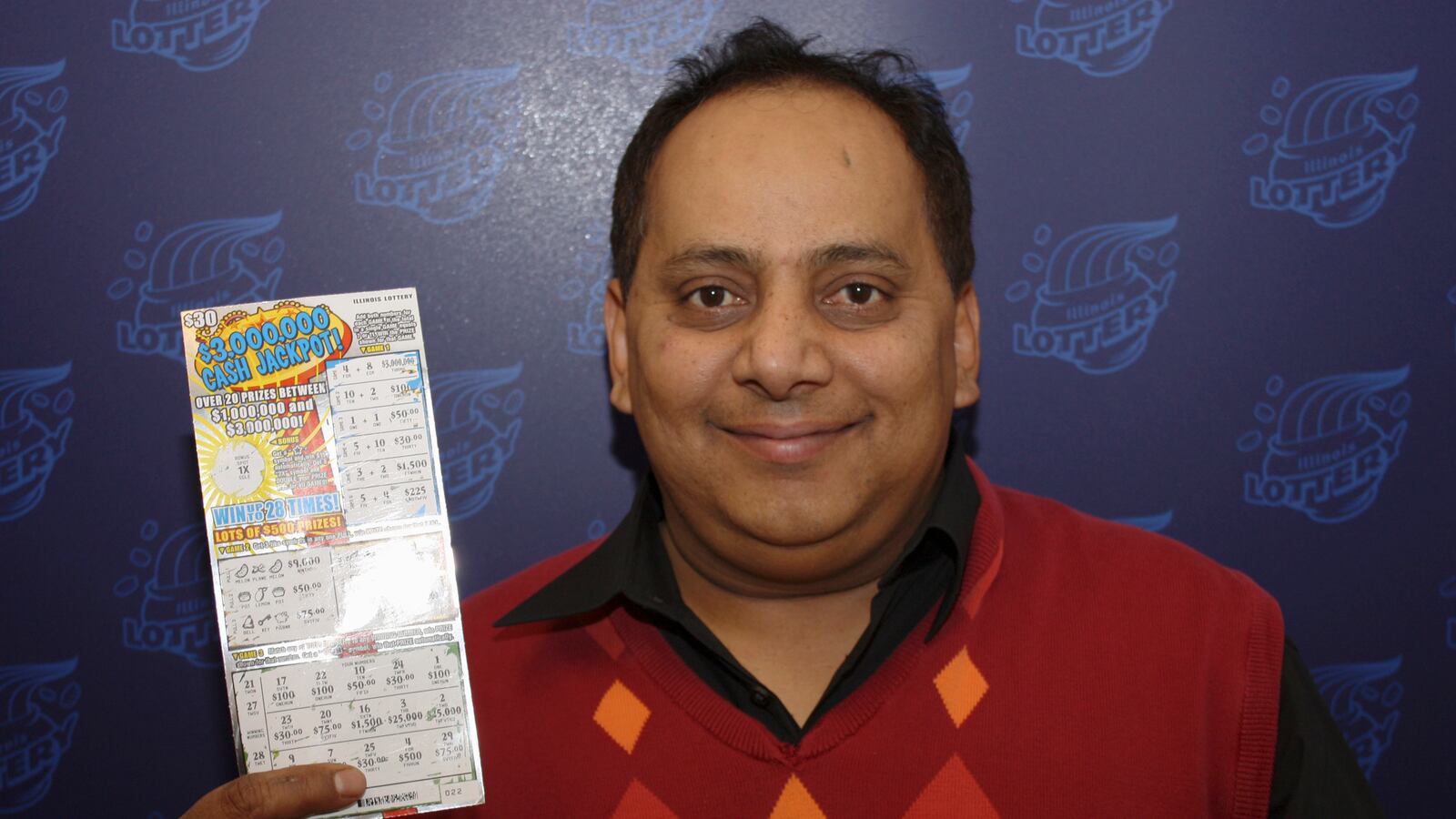When Urooj Khan died suddenly in his Chicago home last July, his death was attributed to arteriosclerotic cardiovascular disease, a condition that hardens the arteries. No autopsy was done because, without an obvious display of injuries, there was no reason to suspect foul play. It wasn’t until an unnamed relative urged the medical examiner’s office to take a closer look at the cause of Khan’s death that a toxicology test was performed, revealing a lethal amount of cyanide in the 46-year-old’s blood. What initially was just another untimely, unfortunate, but natural death of a middle-aged man was at once transformed into a full-blown murder mystery—made even more intriguing by the fact that Khan was a lottery winner.

Police have yet to identify a suspect, and Khan’s widow, Shabana Ansari, who was questioned by cops for more than four hours in November, insists her husband had no enemies—least of all her. But while the Indian immigrant and owner of three dry-cleaning businesses in his adopted hometown of Chicago may have been well liked, he also was coming into a large sum of money. The day before Khan died, the state of Illinois issued him a check for $425,000—the post-taxes sum from the $1 million ticket he’d purchased at his local 7-Eleven back in June.
Khan is, sadly, not the first lotto winner turned murder victim. Just last month a woman in Tampa was sentenced to life in prison without parole for the murder of Abraham Shakespeare. Forty-year-old DeeDee Moore refused to take the stand to defend herself against allegations that she’d befriended Shakespeare after he won $30 million in the Florida lottery, swindled him out of what money he had left after giving most of it away to anyone who asked, and then killed him, buried him under a slab of cement in a backyard, and successfully kept his murder a secret for more than a year.
William and Brenda Evans, a Detroit couple found stabbed to death two weeks after winning the lottery in March of last year, and Jeffrey Dampier, murdered by his secret-lover sister-in-law nine years after he won $20 million in the Illinois state lotto, are other examples. So is the story of William Post III, a Pennsylvania winner who survived his brother’s attempt to kill him and his wife by hiring a hit man.
Whoever killed Khan put enough thought into the act to use not a gun or a knife but cyanide, a deadly toxin that rapidly suffocates its victims without leaving much of a visible trace. After all, it took an anonymous tip from a family member for the Cook County medical examiner to take a second look and discover that Khan had been poisoned.
Investigators have little information to offer on the case, as it was just recently reclassified as a homicide, but it’s almost impossible to consider the few details that are available about the events surrounding Khan’s death without coming up with a few hypotheticals.
“A lottery winner could be anyone. They didn’t do anything special, they just bought a ticket, and now they have more money,” Susan Bradley, a certified financial planner and the founder of the Sudden Money Institute, tells The Daily Beast. “That can create a weird jealousy dynamic. Old emotions come up. People—both the winner and those around them—are put in an exaggerated emotional climate that can result in acts of anger or vengeance.”
Bradley’s organization helps people deal with the unique predicament of becoming suddenly flush with money. This could mean lotto winners, but also the recently divorced or widowed or recipients of an inheritance. “The arrival of big money can bring out feelings that didn’t have time to surface in your life before,” she says.
While murder isn’t one of the risks Bradley normally focuses on with her newly rich clients, she suggests that anyone motivated to kill a lottery winner for money likely overestimates how easily he or she could get their hands on the loot. They might think they could pose as someone else or pressure the actual heir into giving it over, she suggested. Perhaps they think they have some access to the winner’s funds but actually don’t.
When dealing with lottery winners, one of the first questions Bradley asks is, who actually won? Misunderstandings over whom the money belongs to can often lead to anger, tension, and even legal disputes among spouses, family members, friends, or co-workers.
Court records after Khan’s death show that the lotto winner’s brother and Ansari had bickered over the money. His brother was concerned that Khan’s 17-year-old daughter from a previous marriage would not get “her fair share” of the money, since he didn’t leave a will. One could conjecture that Khan’s wife wanted to prevent him from creating a will that favored his daughter. As Ansari’s attorney explained to the Chicago Tribune, Illinois law would most likely split Khan’s estate evenly between his wife and daughter. After extensive questioning, Ansari has not been identified as a suspect, yet she did not alert authorities to her husband’s death, despite being with him when he fell ill not long after the two ate dinner together.
A devout Muslim, Khan vowed to give up gambling—even buying the occasional lotto ticket—after returning from the hajj, the traditional Muslim pilgrimage to Mecca in Saudi Arabia, in 2010. But on that fateful day last June, he couldn’t resist picking up a scratch-off at 7-Eleven. Was this simply an insignificant act of spontaneity? Or was the fact that Khan couldn’t keep his no- gambling resolution a sign that he may have had a problem? If that were the case, he could have owed someone money.
Perhaps Khan’s murder was an act of pure jealousy by someone who knew he or she wouldn’t benefit financially but didn’t think Khan deserved to, either. Lottery winners are almost always inundated with requests from money. Khan could have angered someone by saying no.
At this point all of this is just speculation. Kahn’s body will be exhumed for evidence in the next few weeks, as investigators continue their search for a suspect. Meanwhile, Khan’s wife denies any involvement in his death and works to maintain businesses he built.






